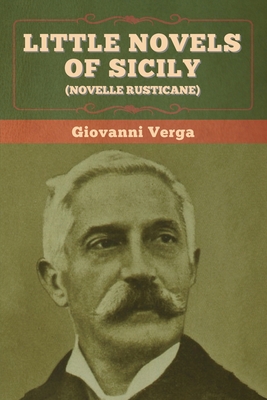




Giovanni Carmelo Verga (2 September 1840 - 27 January 1922) was a Sicilian realist (verista) writer, best known for his depictions of life in his native Sicily, especially the short story (and later play) Cavalleria rusticana it] and the novel I Malavoglia (The House by the Medlar Tree).
The first son of Giovanni Battista Catalano Verga and Caterina Di Mauro, Verga was born into a prosperous family of Catania in Sicily. He began writing in his teens, producing the largely unpublished, but currently quite famous, historical novel Amore e Patria (Love and Country); then, although nominally studying law at the University of Catania, he used money his father had given him to publish his I carbonari della montagna (The Carbonari of the Mountain) in 1861 and 1862. This was followed by Sulle lagune (On the Lagoons) in 1863.
He moved to Milan in 1872, where he developed his new approach, characterized by the use of dialogue to develop character, which resulted in his most significant works. In 1880 his story collection Vita dei campi (Life in the Fields), including Fantasticheria (Daydreaming), La lupa (The She-wolf), Jeli il pastore (Jeli the Shepherd), Pentolaccia (The Plaything), and Rosso Malpelo, most of which were about rural Sicily, came out. It also included Cavalleria rusticana (Rustic Chivalry), which he adapted for the theatre and later formed the basis for several opera librettos including Mascagni's Cavalleria rusticana and Gastaldon's Mala Pasqua . Verga's short story, Malaria, was one of the first literary depictions of the disease malaria.
He then embarked on a projected series of five novels, but only completed two, I Malavoglia and Mastro-don Gesualdo (1889), the second of which was the last major work of his literary career. Both are widely recognized as masterpieces.
In 1894 Verga moved back to Catania, to the house in which he had lived as a child. In 1920 he was appointed Senator of the Kingdom (Senatore del Regno) for life (ad vitam). He died of a cerebral thrombosis in 1922. (wikipedia.org)

Giovanni Carmelo Verga (2 September 1840 - 27 January 1922) was a Sicilian realist (verista) writer, best known for his depictions of life in his native Sicily, especially the short story (and later play) Cavalleria rusticana it] and the novel I Malavoglia (The House by the Medlar Tree).
The first son of Giovanni Battista Catalano Verga and Caterina Di Mauro, Verga was born into a prosperous family of Catania in Sicily. He began writing in his teens, producing the largely unpublished, but currently quite famous, historical novel Amore e Patria (Love and Country); then, although nominally studying law at the University of Catania, he used money his father had given him to publish his I carbonari della montagna (The Carbonari of the Mountain) in 1861 and 1862. This was followed by Sulle lagune (On the Lagoons) in 1863.
He moved to Milan in 1872, where he developed his new approach, characterized by the use of dialogue to develop character, which resulted in his most significant works. In 1880 his story collection Vita dei campi (Life in the Fields), including Fantasticheria (Daydreaming), La lupa (The She-wolf), Jeli il pastore (Jeli the Shepherd), Pentolaccia (The Plaything), and Rosso Malpelo, most of which were about rural Sicily, came out. It also included Cavalleria rusticana (Rustic Chivalry), which he adapted for the theatre and later formed the basis for several opera librettos including Mascagni's Cavalleria rusticana and Gastaldon's Mala Pasqua . Verga's short story, Malaria, was one of the first literary depictions of the disease malaria.
He then embarked on a projected series of five novels, but only completed two, I Malavoglia and Mastro-don Gesualdo (1889), the second of which was the last major work of his literary career. Both are widely recognized as masterpieces.
In 1894 Verga moved back to Catania, to the house in which he had lived as a child. In 1920 he was appointed Senator of the Kingdom (Senatore del Regno) for life (ad vitam). He died of a cerebral thrombosis in 1922. (wikipedia.org)

Published in 1880, one year before Verga's influential novel The Malavoglias, Life in the Country first marked his stylistic shift towards the verismo school of Italian realism. The collection's centrepiece, 'Rustic Honour' ('Cavalleria rusticana') - which was famously adapted into a play by the author before becoming an opera by Mascagni - tells the tale of Turiddu, a poor young man who returns from military service and finds himself embroiled in adultery and a feud with a rival.
Also including the well-known stories 'She-Wolf' and 'Foxfur', Life in the Country captures, in an objective, non-judgemental prose, the difficult conditions and personal struggles of the peasant class in his native Sicily at the turn of the twentieth century.



Giovanni Verga was an Italian realist writer, best known for his depictions of life in Sicily, and especially for the Little Novels of Sicily (Novelle Rusticane)
CONTENTS
Note on Giovanni Verga
His Reverence
So Much For The King
Don Licciu Papa
The Mystery Play
Malaria
The Orphans
Property
Story of The Saint Joseph's Ass
Blackbread
The Gentry Liberty
Across The Sea









This work has been selected by scholars as being culturally important, and is part of the knowledge base of civilization as we know it.
This work is in the public domain in the United States of America, and possibly other nations. Within the United States, you may freely copy and distribute this work, as no entity (individual or corporate) has a copyright on the body of the work.
Scholars believe, and we concur, that this work is important enough to be preserved, reproduced, and made generally available to the public. We appreciate your support of the preservation process, and thank you for being an important part of keeping this knowledge alive and relevant.

